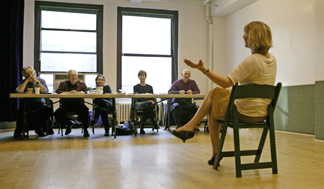Casting Vibe is India’s innovative Digital Casting & Talent Platform that consists of all types of talented people like Actors, Models, Dancer, Musicians, Singers, Photographers, Makeup man, stylists who are part of the Entertainment Industry. Free Registration are open , Please register with and get your ONE URL work portfolio free .If interested Please visit https://castingvibe.com/
Every actor wants to book a job. A booking means you’ve been hired! What’s the audition process to getting booked? Casting Vibe would like to share steps of Casting / audtition process below
The Pre-Audition
The casting process begins with Casting Directors breaking down scripts, identifying speaking roles and their descriptive profiles, and notifying agents (and online casting services if the audition will be open) of the available roles. Agents submit client pictures, resumes, and demo reels. For open auditions actors can do this themselves, too. Casting narrows their selection by actor appearance, training and skills needed for each role. Actors who make that first cut are contacted for auditions.
The First Audition
Generally a script or “sides” are provided in advance of a television audition. For feature films, you’ll need at least one prepared monologue appropriate to the tone of the film. Prepared as you are for that first in-person audition, both features and TV sometimes rely on quick video slates to further narrow casting options. It’s essential to be prepared because that first audition may be no more than the few seconds it takes to state your name to a video camera. However what and how you wear your clothes and hair, how you enter the room, your demeanor signing in—all of your choices at even the “smallest” audition are opportunities to make an impression and show what you can do.
Callbacks
Every time you’re asked to come in after that initial in-person audition is a callback. You might work the same material for the same casting personnel, or it might be entirely new for a different role before all new people. Callback sessions still tend to be brief, usually only a few minutes, and these are typically recorded on video to be discussed among the many casting decision-makers. In television that’s the Casting Director, Showrunner, Creator, Director, other Executive Producers, network and studio executives — though you won’t see most of them in the room just yet. In feature films, it’s the Director, Casting Director, Producer, sometimes the Writer, and the studio or financier, though most of them stay out of the room early-on, too. But just because you don’t see them doesn’t mean they aren’t watching you! That’s why it’s so important to be prepared.
Because so much is now viewed on tape, many actors will not be physically in the room with the producers or casting director, who could be on location filming or living elsewhere, until late in the casting process. Casting guest-stars or co-stars for a television series is less labor-intensive than casting a pilot, which often involves reviewing hundreds of actors within a one- to two-month window. Television projects near final casting will have the Casting Director, Creator, Showrunner, Director (especially if it’s for a pilot), in the room watching what you do. Network or studio casting executives are involved early on, but actors won’t see them in the room until the studio or network test.
For feature film auditions, depending on the role, you may see the Casting Director early on along with the Director and possibly one or more producers or executive producers. For smaller roles you may only see casting subordinates and the First A.D. (Assistant Director). For more involved roles, you may be called back several times or only once and still land the job. The closer they get to booking talent, the more decision-makers may be in the room. And if you get an avail, that means they are interested in booking you for the job, but want to know your schedule. With an avail, you’re one of the finalists!
Testing
The later stages of feature film casting involve working more closely with material, the director, screen partners and sometimes even being put on film. Working with other actors, especially for ensemble productions, help reveal what chemistry is or is not present among a group of performers. Screen tests are typically done late or after a production is cast and involve making hair, make-up, wardrobe, film-stock and lighting decisions. Feature films may use a screen test to decide final actor placement or to make difficult final casting decisions, but most of the time a production won’t spend money on screen testing actors it doesn’t intend to use.
By contrast, a network or studio test is a staple in television casting for major roles and especially for television pilots. For television pilots, the Studio and Network test may be the first time you get to work with the director. However, it is not easy to audition in front of people and still have no audience.
Whether you’re auditioning to one person and a video camera or fifteen decision-makers and their support staff, you can expect little reciprocal engagement from those watching you perform. On the other hand, the Showrunner, Creator, studio or network executives may eat, text, e-mail, take calls or even step out while you audition! That doesn’t mean you aren’t doing good work. This seeming inattention is more likely due to the taxing complexity of keeping any production on track than any deficiency in you. Try to remember that everybody on the other side of the table is interested in and rooting for you. They want you to be good. If you’re good, you’ve solved all their problems!
Whether you’re auditioning for a feature or a television show, the Casting Directors, Directors, EPs, producers, etc., want to see what you can do alone, without encouragement, tweaking or help from them. It’s like getting a base-line of your acting. So if the sides are a two-person scene, expect a dead pan Casting Director to prompt you with flat, unresponsive delivery. The Director may jump in to give you notes or you may get little more than a glance—in either case, you might still get the job! The important thing is to stay focused on your work and make confident choices.
Casting Vibe casting process for a film or television pilot can take days or months. Episodic television runs on a compressed production schedule, so guest roles tend to be cast fairly quickly. Still, episodes can get pushed, rewritten, or shelved. Whether casting a pilot or guest role, the Casting Director, Creator, Director and Showrunner narrow down their favorites and studio and network executives who oversee the show have final say.
In feature films, the Casting Director and EPs may make recommendations but the Director generally finalizes cast, though the financiers can reject those decisions and even pull backing. And keep in mind that television shows change networks, Directors get dropped, financing falls out here, gets picked up there… The casting process isn’t over until the project screens or airs. And even then some filmmakers threaten, and have, re-shot or digitally altered re-releases to remove or add whole scenes, subplots and characters!
Getting cast doesn’t just happen. It’s the result of consistent preparation, patience, and persistence. Whether you book the job or not, auditions are your best chance to become known by Casting Directors. If you’re professional, prepared, and make a good impression, they’ll remember liking you before and will keep you in mind for future roles. Casting Vibe always say’s , Sometimes not booking can lead to better future opportunities.


